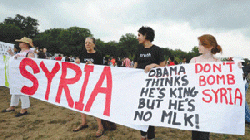DEARBORN— President Barack Obama is facing international condemnation over his consideration of authorizing a U.S. military strike against Syria in only a matter of days. The action could have disastrous implications.
Obama said he would only take military action in Syria, if evidence was found that the Syrian government attacked its own people with chemicals. On Wednesday, United Nations inspectors said they found evidence that Syria attacked civilians with chemicals. According to the group, Doctors Without Borders more than 300 were killed in the attack.
U.N. inspectors were reportedly in great danger as they gathered the evidence, and snipers shot at them. The Syrian opposition which the United States has been arming and supporting financially was also accused of using sarin nerve gas by a United Nations official only a few months ago.
The news of U.S. intervention in Syria has made people around the country anxious, but is even more of a troublesome issue for Syrian Americans who still have family in the country and are concerned about how launching an air assault attack on Syria would impact their relatives’ safety.
Dr. Opada Alzohaili, a Syrian American doctor based in Dearborn, says he has mixed emotions about U.S. military intervention in Syria, and while he believes something must be done to stop the bloodshed there, the president’s proposed action still worries him. “We have friends and family. People will be killed and the infrastructure could be destroyed,” he said.
Dr. Alzohaili’s parents and siblings live in Syria. He says there have been bombings close to his family members’ homes, and he’s lost 16 of his cousins in the crisis. “Life is miserable there. It’s impossible to find food and basic needs to get by everyday,” he said. “There is huge pressure on a daily basis. We are glued to the television.”

He says both the opposition and the Syrian government are at fault for the atrocities that have occurred throughout the crisis. “Both sides have caused a lot of problems,” he said.
President Obama addressed Americans about launching a strike against Syria, but still hasn’t received authorization from Congress to do so. Although the White House has reached out to a few members, many believe that’s not good enough and that Congress, as a whole, needs to vote on the action before a decision is made.
Syrian American Ziad Abu Fadel, an attorney and member of the Syrian American Forum, a group vocally open about being against foreign intervention in Syria, says a U.S.-led military attack on Syria could trigger another war that would have even worse repercussions than the ones fought in Afghanistan and Iraq.
He says the situation with Syria is different, because it is well armed and has unwavering support from Russia and Iran. “This is much worse for the United States. Syria is well armed. The Iraqis didn’t have anything like this,” Fadel said.
There is also a chance Western intervention in Syria could result in an attack on the United States. Syria said it would use “all means” to react to an attack.
Possible targets have been identified by the Pentagon if an air strike does take place.
Both Britain and France say they will stand by Obama’s decision to take military action in Syria.
Fadel says the proposed air assault would likely harm innocent civilians inside Syria. Fayez Abboud, 23, another Syrian American, is also worried about the safety of innocent people, and is opposed to any foreign intervention in Syria.
Abboud has family in Syria, and says the majority of the people there support Syrian President Bashar Al Assad. “Probably about 90 percent of people in Syria support the government and only 10 percent support the opposition,” Abboud said.
A poll by NATO in June showed that 70 percent of Syrians support President Bashar al-Assad, 20 percent adopt a neutral position and only 10 percent support the rebels.
Fadel also says an overwhelming majority of people in Syria support the country’s current government over the opposition. “When a rebel takes a heart and eats it, it is not a human being,” Abboud said responding to a video shown on the internet of a rebel cutting out a soldier’s heart and eating it.
Fadel criticized the United States for being so heavily involved in the Syrian conflict, while ignoring other ongoing war crimes in different countries. “This is a fraud war,” he said.
Ali Kaakarli, a Syrian American graduate student at the University of Michigan Ann Arbor, is against the intervention, but understands why some Syrians would be supportive of it. “I sympathize with Syrians in Syria that cheer any kind of help, but in the end can’t accept that it will improve the situation, as I don’t believe that is what the U.S. is out to do,” Kaakarli said. “Assad and his crackdown are responsible for this intervention. People left Syria because of him. We are all here because of him.”






Leave a Reply